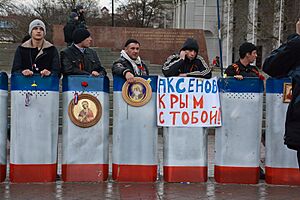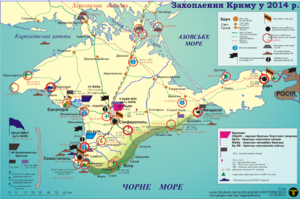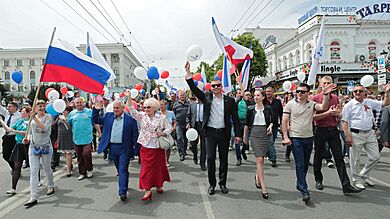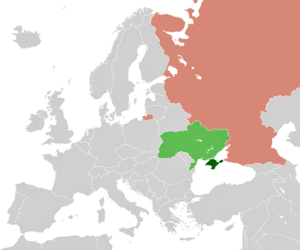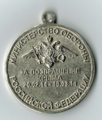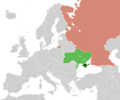Annexation of Crimea by the Russian Federation facts for kids
Quick facts for kids Annexation of Crimea by the Russian Federation |
|||||||
|---|---|---|---|---|---|---|---|
| Part of the Russo-Ukrainian War | |||||||
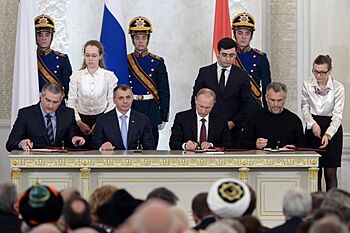 Russian President Vladimir Putin signs the treaty of accession (annexation) with Crimean leaders in Moscow, 18 March 2014. |
|||||||
|
|||||||
| Belligerents | |||||||
| Commanders and leaders | |||||||
|
|
||||||
| Units involved | |||||||
|
Based in Crimea, Navy
Deployed to Crimea, elements of Ground Forces
(GRU command)
Airborne
Navy
Special Operations Forces
|
Armed forces Navy
Paramilitary Interior troops
Border guards
|
||||||
| Strength | |||||||
|
Protesters
Volunteer units
Russian military forces
|
Protesters
Ukrainian military forces
|
||||||
| Casualties and losses | |||||||
| 1 Crimean SDF trooper killed |
|
||||||
| 2 civilian deaths (during the protests), 1 civilian killed (by Crimean SDF under command of a former Russian serviceman) | |||||||
In February and March 2014, Russia took control of the Crimean Peninsula, which is part of Ukraine. Russia then officially made Crimea part of its own country. This event happened right after a big change in Ukraine's government, known as the Revolution of Dignity. It also marked the start of the Russo-Ukrainian War.
The changes in Ukraine's government in February 2014 caused protests in Crimea. People who supported Russia were against the new Ukrainian government. At the same time, Russian President Vladimir Putin talked about Ukraine with his security team. He said they should "start working on returning Crimea to Russia." On February 27, Russian special forces (soldiers without clear uniforms) took over important places in Crimea.
Even though Russia first said its military was not involved, Putin later admitted that troops were there to support Crimea's local defense groups. When Russian troops took over Crimea's parliament, they removed the existing Crimean government. They put in a new government that supported Russia, led by Sergey Aksyonov. This new government then announced a vote, called a referendum, on Crimea's future.
The referendum happened while Russian forces were in control. According to the new Russian-backed authorities, most people voted to join Russia. The next day, March 17, 2014, Crimea's leaders declared themselves independent. They then asked to join Russia. Russia officially made Crimea part of its country on March 18, 2014. It became known as the Republic of Crimea and the city of Sevastopol. After this, Russia increased its military presence in Crimea.
Ukraine and many other countries said that Russia's actions were wrong. They believed it broke international law and agreements that protected Ukraine's borders. Because of this, other countries in the G8 group suspended Russia. They also put sanctions (penalties) on Russia. The United Nations General Assembly also said the referendum and annexation were invalid. They passed a resolution saying Ukraine's borders should be respected. They called Russia's actions a "temporary occupation."
The Russian government does not use the word "annexation." President Putin said the referendum followed the idea of self-determination, meaning people should decide their own future.
Different Names for the Event
People use different names to describe what happened in Crimea.
In Ukraine
In Ukraine, this event is often called the temporary occupation of Crimea and Sevastopol by Russia. It is also known as the illegal occupation of Crimea, the fall of Crimea, or the invasion of Crimea.
In Russia
In Russia, it is known as the accession of Crimea to the Russian Federation. Other names used are the return of Crimea or the reunification of Crimea.
Crimea's Past

Crimea has a long history. It was part of the Crimean Khanate from 1441. Then, in 1783, the Russian Empire took control of it. After the Russian Empire ended, there were several short-lived governments in Crimea.
In 1921, the Bolsheviks took control. Crimea became an autonomous republic within the Russian Soviet Federative Socialist Republic (RSFSR). The RSFSR then joined with other republics to form the Soviet Union in 1922.
After Second World War, in 1944, the Soviet government forced all the native Crimean Tatars to leave Crimea. In 1946, Crimea lost its special autonomous status. In 1954, Crimea was moved from the Russian SFSR to the Ukrainian SSR. This was done to celebrate 300 years of Ukraine's connection with Russia.
In 1989, under Mikhail Gorbachev's leadership, the Soviet government said the deportation of the Crimean Tatars was illegal. The Crimean Tatars, who are mostly Muslim, were allowed to return home.
In 1990, Crimea's local government wanted to get back its autonomous status. In 1991, Crimea held a vote about becoming a separate republic within the Soviet Union. But the dissolution of the Soviet Union was already happening. Crimea's autonomous status was restored for a short time as part of the Ukrainian SSR. After Ukraine became independent in 1991, Crimea kept its autonomous status within Ukraine.
During the 1990s, Russia and Ukraine had disagreements over the Black Sea Fleet. This was about who controlled the naval ships and bases in Crimea. In 1998, a treaty divided the fleet. Russia was given a naval base in Sevastopol. Another treaty recognized the existing borders between Russia and Ukraine.
In 2008, Ukraine's Foreign Minister said Russia was giving Russian passports to people in Crimea. He called this a "real problem." This was because Russia had said it might use its military to protect Russian citizens abroad.
In 2009, there were anti-Ukrainian protests in Crimea by ethnic Russians. A local politician said he hoped Russia would treat Crimea like it treated South Ossetia and Abkhazia. Crimea has a majority of ethnic Russians. It also has minorities of ethnic Ukrainians and Crimean Tatars.
Some experts believed Russia had plans to take Crimea even in 2010. They thought Russia was waiting for the right moment.
Euromaidan and the Revolution of Dignity
The Euromaidan protests started in Kyiv in November 2013. This happened after President Viktor Yanukovych decided not to sign an agreement with the European Union. Yanukovych had strong support from voters in Crimea and southern and eastern Ukraine. The Crimean government supported Yanukovych. They said the protests were "threatening stability."
On February 4, 2014, Crimea's parliament said it would consider holding a vote on Crimea's status. The head of the parliament said the 1954 transfer of Crimea to Ukraine was a mistake.
The Euromaidan protests became very intense in late February 2014. President Yanukovych left the capital on February 22. The Ukrainian parliament then voted to remove him from his position. Arseniy Yatsenyuk was appointed to lead a temporary government. This new government was recognized by many countries. However, the Russian government called these events a "coup d'état" (a sudden, illegal takeover of power). They said the new government was not legitimate. Some researchers say Russia's actions in Crimea were a "military coup." This is because the Russian military took over buildings and helped change the government in Crimea.
Taking Control of Crimea
Russian Invasion of Crimea
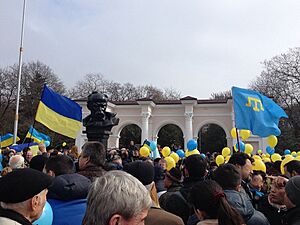

The protests in Ukraine in February 2014 led to a political crisis in Crimea. At first, there were demonstrations against Ukraine's new government. But things quickly got more serious.
On February 20, several buses with Crimean license plates were stopped. Their passengers were scared, and some buses were burned. Russian media later used this event to spread false information.
On February 22–23, Russian President Vladimir Putin met with his security leaders. He said they needed to "start working on returning Crimea to Russia." After this, Russian intelligence agencies began working with local supporters. They wanted to make sure there would be "local self-defense groups" ready to help when the operation started. On February 23, pro-Russian demonstrations took place in Sevastopol.
Crimea's prime minister, Anatolii Mohyliov, said his government recognized the new Ukrainian government. He said Crimea would follow all laws passed by Ukraine's parliament. In Simferopol, a pro-Russian protest happened where people replaced the Ukrainian flag with a Russian flag. The next day, a large pro-Ukrainian rally took place. People waved Ukrainian, Tatar, and European Union flags. They demanded the Crimean parliament resign.
Meanwhile, in Sevastopol, thousands protested against the new Ukrainian government. They voted to create their own local government. They also formed civil defense groups with support from a Russian motorcycle club. Protesters waved Russian flags and chanted "Putin is our president!" They said they would not pay taxes to Ukraine. Reports also mentioned Russian military convoys in the area.
In Kerch, pro-Russian protesters tried to take down the Ukrainian flag from city hall. The mayor tried to stop them, and police arrived to protect the flag. The mayor said, "This is the territory of Ukraine, Crimea." But he was accused of treason, and a fight broke out over the flagpole.
On February 24, more protests happened in Sevastopol. Pro-Russian demonstrators, along with some Cossack groups, demanded that a Russian citizen be elected mayor. They raised Russian flags around the city administration. They also handed out flyers to recruit people for a self-defense group.
The head of Sevastopol's administration, Volodymyr Yatsuba, resigned. He said it was because of the "decision of the city's inhabitants." The Sevastopol City Council then illegally elected Alexei Chaly, a Russian citizen, as mayor. Under Ukrainian law, Sevastopol could not elect a mayor. The mayor was appointed by the President of Ukraine. Protesters chanted "A Russian mayor for a Russian city."
On February 25, hundreds of pro-Russian protesters blocked the Crimean parliament. They demanded that the parliament not recognize Ukraine's central government. They also wanted a vote on Crimea's status.
On February 26, about 4,000–5,000 Crimean Tatars and their supporters protested near the Crimean parliament building. They faced about 600–700 supporters of pro-Russian groups. The Tatar leaders organized their protest to stop the Crimean parliament from making decisions that would separate Crimea from Ukraine. The head of the Crimean parliament said they would not consider separating from Ukraine. By night, the Crimean Tatars left. Several hundred Russian supporters remained.
Ukraine's acting Interior Minister told Crimean police not to cause conflicts. He wanted them to prevent clashes with pro-Russian forces. The new head of Ukraine's Security Service asked the United Nations to monitor the situation in Crimea. Russian troops then took control of the main road to Sevastopol. They set up a military checkpoint with a Russian flag and military vehicles.
Russian Takeover
On February 27, unmarked Russian forces, along with local police and Russian troops in police uniforms, took over buildings in Simferopol. These included the building of the Supreme Council of Crimea and the Council of Ministers. Russian flags were raised over these buildings. Pro-Russian forces also occupied some areas in Kherson Oblast that are geographically part of Crimea.
While the "little green men" were in the Crimean parliament building, the parliament held an emergency meeting. They voted to remove the Crimean government. They replaced Prime Minister Anatolii Mohyliov with Sergey Aksyonov. Aksyonov's party had received only 4% of the vote in the last election. Under Ukraine's constitution, the President of Ukraine had to approve the Prime Minister of Crimea. Both Aksyonov and the speaker of parliament said they saw Viktor Yanukovych as the true president of Ukraine. Through him, they could ask Russia for help.
The parliament also voted to hold a vote on greater autonomy for Crimea. This vote was planned for May 25. The troops had cut off all communication in the building. They took MPs' phones as they entered. No independent journalists were allowed inside during the voting. Some MPs said they were threatened. They also said votes were cast for them and other MPs who were not even in the room. A separatist leader later said that Crimean MPs were forced to support the annexation at gunpoint. Ukraine's temporary government immediately said these actions were illegal.
On the same day, more unmarked troops set up checkpoints. These checkpoints were on the Isthmus of Perekop and the Chonhar Peninsula. These areas separate Crimea from mainland Ukraine. Within hours, Ukraine was cut off from Crimea. Soon after, Ukrainian TV channels stopped working in Crimea. Some were replaced with Russian channels.
On March 1, 2014, Aksyonov said he would control all Ukrainian military and security sites in Crimea. He also asked Putin for "assistance in ensuring peace" in Crimea. Putin quickly got permission from Russia's parliament for a Russian military intervention in Ukraine. This was to last until the situation in Ukraine became normal. Putin's quick move led to protests in Russia against a military campaign in Crimea. By March 2, Russian troops from their naval base in Sevastopol had taken complete control of the Crimean Peninsula. These Russian troops operated without clear uniforms. On March 3, they blocked Southern Naval Base.
On March 4, Ukraine's military said that Russian army units were operating in Crimea. This was instead of just Russian Black Sea Fleet personnel. This broke international agreements between Ukraine and Russia. At a press conference that day, Russian President Vladimir Putin said Russia had no plans to take Crimea. He also said Russia had no plans to invade Ukraine. But he added that Russia might step in if Russians in Ukraine were threatened. This was part of Russia's effort to hide its military actions.
Many news reports and statements from Ukrainian and foreign governments said the unmarked troops were Russian soldiers. But Russian officials hid their identity. They claimed the troops were local "self-defense" units that they did not control. Putin later admitted that he had ordered "work to bring Crimea back into Russia" as early as February. He also said that in early March, "secret opinion polls" in Crimea showed strong support for joining Russia.
Russia eventually admitted its troops were there. The Defense Minister said Russia's military actions in Crimea were done by forces from the Black Sea Fleet. He said this was needed because of a "threat to lives of Crimean civilians" and a danger of "takeover of Russian military infrastructure by extremists." Ukraine complained that Russia broke agreements by increasing its troops in Crimea. Ukraine said Russia violated its sovereignty. The United States and United Kingdom accused Russia of breaking the Budapest Memorandum on Security Assurances. In this agreement, Russia, the US, and the UK promised not to use force against Ukraine's borders or independence. The Russian government said the agreement did not apply because of "internal political or socio-economic factors."
Crimean Referendum
On February 27, 2014, after Russian special forces took over its building, the Supreme Council of Crimea voted to hold a referendum on May 25. The first question was about increasing Crimea's autonomy within Ukraine. The date was later moved to March 30. A Ukrainian court said the referendum was illegal.
On March 6, the Supreme Council moved the referendum date again, to March 16. They also changed the question. The new question was whether Crimea should join Russia or restore its 1992 constitution within Ukraine. This new referendum did not offer the option to keep things as they were under the 1998 constitution. Ukraine's acting president, Oleksandr Turchynov, said that the authorities in Crimea were "totally illegitimate." He said they were forced to work "under the barrel of a gun" and their decisions were illegal.
On March 14, Ukraine's Constitutional Court said the Crimean referendum was against the constitution. A day later, Ukraine's parliament officially dissolved the Crimean parliament. With the referendum approaching, Russia gathered troops near Ukraine's eastern border. This was likely to threaten Ukraine and stop it from reacting.
The referendum happened despite Ukraine's opposition. Official results said about 95.5% of voters in Crimea (with 83% turnout) wanted to leave Ukraine and join Russia. Most Crimean Tatars did not vote. A report by a member of the Russian President's Human Rights Council suggested the official results were too high. It said between 50-60% of Crimeans voted to join Russia, with 30-50% turnout. A survey in 2014 found that most Crimean residents (91%) believed the referendum was fair. They also thought the government in Kyiv should accept the results (88%).
Many foreign governments and news outlets criticized how the referendum was done. There were reports that anyone with a Russian passport could vote, even if they did not live in Crimea. The OSCE (Organization for Security and Co-operation in Europe) refused to send observers. Russia invited observers from some European far-right political parties. These observers said the referendum was fair.
Crimea Declares Independence
The Republic of Crimea existed for a very short time. On March 17, after the referendum results were announced, the Supreme Council of Crimea declared Crimea formally independent. This new Republic of Crimea included both the Autonomous Republic of Crimea and the city of Sevastopol. Sevastopol was given a special status within the new republic. The Crimean parliament said some Ukrainian laws were no longer valid. They began taking over private and Ukrainian state property in Crimea. This included Ukrainian ports and property of a gas company. The parliament also officially asked the Russian government to accept the new republic into Russia. Sevastopol asked to be a "city of federal significance." On the same day, the Supreme Council changed its name to the State Council of Crimea. They also made the Russian ruble an official currency alongside the hryvnia. In June, the Russian ruble became the only legal money.
Putin officially recognized the Republic of Crimea as a "sovereign and independent state" on March 17.
On March 21, the Republic of Crimea became a federal part of Russia.
=Joining Russia

A treaty to join Crimea to Russia was signed on March 18, 2014. It was signed by representatives from Crimea (including Sevastopol) and Russia. This treaty set the terms for Crimea and Sevastopol to immediately become parts of the Russian Federation. On March 19, the Russian Constitutional Court said the treaty followed Russia's constitution. Russia's parliament approved the treaty by March 21. The Republic of Crimea and the federal city of Sevastopol became the 84th and 85th parts of Russia.
On March 18, during an event in Simferopol, some Ukrainian sources said armed people, believed to be Russian special forces, attacked a base. Russian authorities disagreed. They later said they arrested a Ukrainian sniper for killings, but then denied the arrest.
Two people who died had a joint funeral. Both Crimean and Ukrainian officials attended. A Ukrainian soldier and a Russian "self-defense volunteer" were mourned together. The incident was investigated by both Crimean and Ukrainian authorities.
After the shooting, Ukraine's acting defense minister allowed Ukrainian troops in Crimea to use deadly force if their lives were in danger. This increased the risk of violence during any takeover of Ukrainian military sites. However, later Russian operations to take over Ukrainian military bases and ships in Crimea did not cause new deaths. Some people were injured, and weapons were used. Russian units were told to avoid using deadly force when possible. Ukrainian troops had low morale. They had been blocked inside their bases for three weeks without help from the Ukrainian government. Most of them did not offer much resistance.
On March 24, the Ukrainian government ordered all its armed forces to leave Crimea. About 50% of Ukrainian soldiers in Crimea joined the Russian military. On March 26, the last Ukrainian military bases and ships were taken by Russian troops.
Russian Control
On March 27, the United Nations General Assembly passed a resolution. It said the Crimean referendum and the change in status were invalid. The vote was 100 in favor, 11 against, with 58 countries not voting.
Crimea and Sevastopol changed their time zone to Moscow Time on March 29.
On March 31, Russia ended two agreements with Ukraine. These were about Russia's Black Sea Fleet in Sevastopol. Putin said this was because Crimea and Sevastopol had joined Russia. On the same day, he signed a decree to officially restore the rights of the Crimean Tatars. They had been forced from their homes in 1944. Other minority groups like Armenians, Germans, Greeks, and Bulgarians, who were also removed by Josef Stalin in the 1940s, also had their rights restored.
Also on March 31, 2014, Russian Prime Minister Dmitry Medvedev announced plans to quickly connect Crimea to Russia's economy and infrastructure. Medvedev said a new ministry for Crimean affairs would be created. He ordered top ministers to make a development plan for Crimea their main goal. On April 3, 2014, Crimea and Sevastopol became part of Russia's Southern Military District. On May 7, 2015, Crimea changed its phone code system from Ukrainian to Russian numbers.
On April 11, the Constitution of Crimea and the City Charter of Sevastopol were approved by their local governments. They became effective the next day. These new parts of Russia were also added to the Russian Constitution.
On April 14, Vladimir Putin announced he would open a bank account with Bank Rossiya. He said it would be the main bank in Crimea. He also gave the bank the right to handle payments for Russia's electricity market.
Russia pulled its forces from southern Kherson in December 2014.
In July 2015, Russian Prime Minister, Dmitry Medvedev, said Crimea was fully part of Russia. Until 2016, these new areas were grouped into the Crimean Federal District.
On August 8, 2016, Ukraine reported that Russia had increased its military presence near the border. Ukraine also sent more troops to the border with Crimea. On August 10, Russia claimed two of its servicemen were killed in clashes with Ukrainian commandos. Russia also said Ukrainian servicemen were captured with explosives. Ukraine denied the incident happened.
Russian reports claimed that Russian FSB (security service) arrested "Ukrainian saboteurs" and "terrorists" near Armiansk. A gunfight reportedly left one FSB officer and a suspect dead. Several people were arrested. The group was supposedly planning attacks on important infrastructure in Crimea.
Ukrainian media reported that one of the arrested, Yevhen Panov, was a military volunteer. Ukraine's government called Russia's accusations "senseless." They argued that since Crimea was Ukrainian territory, Russia was the one supporting terrorism there.
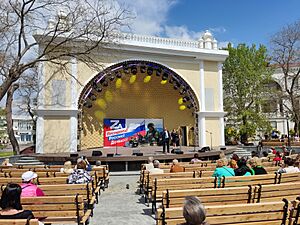
In 2017, a survey showed that 85% of non-Crimean Tatar people believed that if the referendum happened again, the results would be similar. Crimea became fully part of the Russian media. Connections with the rest of Ukraine were almost gone.
On November 26, 2018, Ukraine's parliament voted to impose martial law. This was along Ukraine's coastal regions and those bordering Russia. This happened after Russia fired upon and seized Ukrainian naval ships near Crimea. The measure took effect on November 28, 2018, and ended on December 26.
On December 28, 2018, Russia finished building a high-tech security fence. This marked the unofficial border between Crimea and Ukraine.
In 2021, Ukraine started the Crimea Platform. This was a diplomatic effort to protect the rights of Crimean people. It also aimed to eventually reverse the annexation of Crimea.
Changes and Effects
Economic Impact
Right after the annexation, salaries increased, especially for government workers. But this was soon canceled out by rising prices. This was due to the value of the ruble falling. Wages were cut by 30% to 70% after Russia took control. Tourism, which was Crimea's main industry, suffered a lot. It was down by 50% from 2014 to 2015. Crimean farming also suffered greatly. Ukraine cut off water supplies through the North Crimean Canal. This canal provides 85% of Crimea's fresh water. This caused the 2014 rice crop to fail and damaged other crops. The annexation also negatively affected Russians working in Ukraine and Ukrainians working in Russia.
The number of tourists visiting Crimea in 2014 was lower than in previous years. This was due to "Western sanctions," ethical concerns from Ukrainians, and difficulty for Russians to get there. The Russian government tried to boost tourism by paying for holidays in Crimea for children and state workers. In 2015, about 3 million tourists visited Crimea. Before the annexation, it was around 5.5 million on average. The drop was mostly because tourists from Ukraine stopped coming. Hotels and restaurants also had trouble finding enough seasonal workers. These workers mostly came from Ukraine in previous years. Tourists complained about the low standard of rooms and facilities in state-owned hotels.
According to a German newspaper, taking Crimea was not good for Russia's economy. Russia would have to spend billions of euros each year on salaries and pensions. Also, Russia would need to build expensive projects to connect Crimea to its water and power systems. This is because Crimea has no land connection to Russia. It currently gets water, gas, and electricity from mainland Ukraine. This required building a bridge and a pipeline across the Kerch Strait.
The then-Deputy Finance Minister of Russia said that Vladimir Putin made the decision to annex Crimea alone. He did not consult Russia's Finance Ministry.
A Russian business newspaper said Russia would not gain much economically from Crimea. Crimea is not very developed industrially. Its yearly product is only $4 billion. The newspaper also said everything from Russia would have to be delivered by sea. Higher transportation costs would lead to higher prices for everything. To avoid a drop in living standards, Russia would have to support Crimean people for a few months. In total, the newspaper estimated the cost of integrating Crimea into Russia at $30 billion over ten years, or $3 billion per year.
Experts believe that Russia taking Crimea gave it access to oil and gas reserves. These reserves could be worth trillions of dollars. It also took away Ukraine's chance to be energy independent. Russia's control might change the route of a gas pipeline, saving Russia money and time.

The Russian Federal Service for Communications warned about a transition period. Russian phone operators had to change phone numbers. The country code changed from Ukrainian +380 to Russian +7. City codes also had to change. Sevastopol got the 869 code, and the rest of Crimea got 365. When Crimea joined Russia, phone and internet providers were connected to the outside world through Ukraine. Russia's Minister of Communications announced that postal codes in Crimea would now have six numbers. For example, Simferopol's postal code 95000 became 295000.
In the area that became the border between Crimea and Ukraine, natural borders were created. On early June 2014, Russian Prime Minister Dmitry Medvedev signed a government order. It set up air, sea, road, and railway checkpoints. These decisions created a legal basis for border control in Crimea and Sevastopol.
In the year after the annexation, armed people took over various Crimean businesses. These included banks, hotels, shipyards, farms, gas stations, and bakeries. Russian media called this trend "returning to the 90's." This was seen as a time of disorder and gangs in Russia.
After 2014, the Russian government invested a lot in Crimea's infrastructure. They repaired roads, modernized hospitals, and built the Crimean Bridge. This bridge connects Crimea to the Russian mainland. They also tried to find new water sources, which was very difficult. This was to replace the water supplies from Ukraine that were cut off. In 2015, Russia's Investigative Committee announced cases of theft and corruption in Crimea's infrastructure projects. Some spending was three times higher than the actual costs. Several Russian officials were arrested for corruption.
According to Ukrainian figures from February 2016, 10% of Ukraine's security service personnel left Crimea after the annexation. Also, 6,000 of the 20,300 Ukrainian army members in Crimea left.
Because of Crimea's disputed political status, Russian mobile operators never fully expanded there. All mobile services are offered through "internal roaming." This caused problems inside Russia. Telecom companies said expanding to Crimea would put them at risk of Western sanctions. This could mean losing access to important equipment and software.
The first five years of Russian control in Crimea cost Russia over $20 billion. This is about equal to two years of Russia's entire education budget.
Human Rights Situation
According to the United Nations and many organizations, Russia is responsible for many human rights abuses in Crimea. These include torture, unfair arrests, forced disappearances, and discrimination. This includes the persecution of Crimean Tatars since the annexation. The UN Human Rights Office has documented many human rights violations in Crimea. They noted that minority Crimean Tatars have been affected the most. In December 2016, the UN General Assembly voted on a resolution about human rights in Crimea. It called on Russia to "immediately end all abuses against residents of Crimea." This included stopping discrimination, arbitrary arrests, torture, and other cruel treatment. It also urged Russia to "immediately release Ukrainian citizens who were unlawfully detained."
After the annexation, Russian authorities banned Crimean Tatar organizations. They filed criminal charges against Tatar leaders and journalists. They also targeted the Tatar population. Some groups have called this a form of collective punishment. They say it is a war crime under international law.
In March 2014, Human Rights Watch reported that pro-Ukrainian activists and journalists were attacked, kidnapped, and tortured. Some Crimeans simply "disappeared" without explanation.
On May 9, 2014, a new "anti-extremist" law in Russia came into effect. This law made it a crime to call for violating Russia's borders (including calls for Crimea to leave Russia). This could lead to a fine or imprisonment. If such statements were made in public media or online, the punishment could be even harsher.
According to a report on the Russian government's human rights website, Tatars who opposed Russian rule were persecuted. Russian laws limiting freedom of speech were put in place. The new Russian authorities also "liquidated" the Kyiv Patriarchate Orthodox church in Crimea. The Crimean Tatar television station was also shut down by Russian authorities.
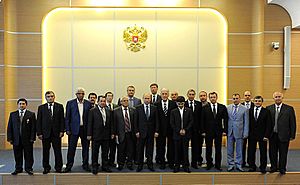
On May 16, the new Russian authorities in Crimea banned the yearly events remembering the deportation of the Crimean Tatars by Stalin in 1944. They said it was to prevent "provocation by extremists." Before, when Ukraine controlled Crimea, these events happened every year. The Russian-backed Crimean authorities also banned Mustafa Dzhemilev. He is a human rights activist and a member of the Ukrainian parliament. He was not allowed to enter Crimea. Also, the Mejlis (Crimean Tatar assembly) reported that Russian security officers raided Tatar homes. They claimed it was for "suspicion of terrorist activity." The Tatar community still held commemorative rallies despite the ban. In response, Russian authorities flew helicopters over the rallies to try and disrupt them.
In May 2015, a local activist was sentenced to four years in prison. His lawyer said the case was made up and that his client had been beaten. The Crimean prosecutor accused the activist of making Nazi gestures during the protests. She said they were judging "not just [him], but the very idea of fascism and Nazism." The lawyer responded that his client was being tortured for a political idea.
In February 2016, human rights defender Emir-Usein Kuku from Crimea was arrested. He was accused of belonging to an Islamist organization, which he denied. Amnesty International called for his immediate release.
On May 24, 2014, Ervin Ibragimov, a former local council member and Crimean Tatar, went missing. Video footage showed him being stopped by a group of men and forced into their van. According to a human rights group, Russian authorities refused to investigate his disappearance.
In May 2018, Server Mustafayev, a human rights movement founder, was imprisoned by Russian authorities. He was charged with "membership of a terrorist organization." Amnesty International and Front Line Defenders demanded his immediate release.
On June 12, 2018, Ukraine filed a large document with the UN's International Court of Justice. It was about racial discrimination by Russian authorities in Crimea. It also mentioned state financing of terrorism by Russia in Donbas.
Between 2015 and 2019, over 134,000 people living in Crimea applied for and received Ukrainian passports.
See Also
- Russian occupation of Crimea
- Russo-Ukrainian War
- Revolution of Dignity
- 2014 Crimean status referendum
- Crimean Tatars
Images for kids
-
Euromaidan in Kyiv, 11 December 2013
-
A pro-Ukrainian demonstration in Simferopol (Ukrainian flag on the left, Crimean Tatar flag on the right) during the Russian military intervention in Crimea, 9 March 2014
-
Medal of the Russian Defense Ministry "For the return of Crimea" (Russian: За возвращение Крыма), 20 February – 18 March 2014
-
President Putin with Vladimir Konstantinov, Sergey Aksyonov and Alexey Chaly at the Kremlin, 18 March 2014
-
May Day parade in Simferopol, 1 May 2019.
-
A pro-war propaganda event in Sevastopol, Crimea, 29 April 2022
-
Vladimir Putin and his close confidant Arkady Rotenberg before the opening of the Crimean Bridge in May 2018
-
Russian President Putin meeting with representatives of the Crimean Tatars, 16 May 2014


